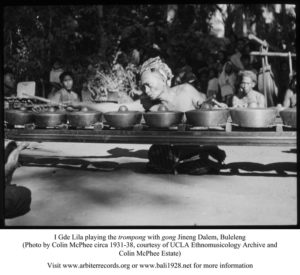Planning for 2025 National Library Singapore: multimedia installation from the Bali 1928 Archive including our curated collection of 1930s Bali films and related music recordings from Odeon and Beka 1928-29. For the exhibition documenting the visit by four pioneering Singapore painters to Bali in 1952 anchored by photographs taken by Liu Kang during the trip.
Allan Evans: Sound Archaeologist, tribute by James Irsay. June 2020
Allan Kozinn.New York Times on Allan Evans and Arbiter.March 2005
Herbst.Songlines. SL150. Aug-Sept 2019
Asian Music review Bali 1928 volumes I–V
Ethnomusicology review Bali 1928 volumes I–V
Australian Broadcasting Corporation Podcast on Colin McPhee
Asian Music review Bali 1928 volume I: Gamelan Gong Kebyar
The Wire October 2015 review of Bali 1928 vol. II and Anthology
Jakarta Post on Bali 1928 Reviving the Legacy
Jakarta Post Bali Buzz 2015 on Bali 1928
Jakarta Post 2017 on Preserving Legacy
Ethnomusicology review volume I
Kompas review of Bali 1928 Cultural Dialogue (2015) in Indonesian
NRC 20091204 Artikel Bali 1928 by René van Peer (in Dutch)
Cahiers d’ethnomusicologie review by Éric Vandal (in French)
ARSC Association of Recorded Sound Collections Bali 1928 vol III review
“This is a brilliant comprehensive view of Bali’s musical and dance-drama history in the early twentieth century, based on rare recordings, photos and films, and enriched by extensive interviews with Balinese of all ages and talents. Herbst answers some very big questions: about the impact of colonial power on everyday Balinese culture, about the fundamental nature of Balinese music before and after the reorganization of Balinese society, and about the practice of improvisation in Bali. Herbst demonstrates that there were significant changes going on within Balinese creative arts in the first part of the twentieth century, changes which have been unknown heretofore to historians and anthropologists of Indonesia. He shows that Bali’s 20th-century musical, choreographic and theatrical life began and is still moving into a more self-conscious phase, an awareness of its own traditions and an indigenous re-invention of the notion of “avant garde” with all its implications for the richness of creativity and layered interpretations. He is aware of the largest social contexts of musical composition and performances as well as the smallest and most intimate. His impact on Indonesian intellectual life cannot be over-exaggerated.” – Hildred Geertz, Professor of Anthropology Emerita, Princeton University
“Voices in Bali is a very remarkable book. In my opinion it is the first book written by a Western scholar who has really succeeded to feel and experience from within the magic exaltation of the Balinese artist during the performance of his art (music and dance and theatre)”. – Anak Agung Madé Djelantik, author of Birthmark: Memoirs of a Balinese Prince
“Since 1971, Edward Herbst’s research in Bali’s performing arts has produced a significant body of knowledge, including his acclaimed 1997 book “Voices in Bali.” His latest project offers perhaps his most meaningful contributions. Over the past 15 years, he has lovingly searched archives of sound and film recordings of Balinese performing arts from the 1920s and 30s. He and his Balinese team then sought out elder artists related to these recordings through family and village ties, fleshed out the significance of both music and film, and opened important new areas of research. Allan Evans of Arbiter Records in New York carefully restored, digitized and republished the audio recordings in collaboration with Herbst. He and his Indonesian colleagues at the IT institute STIKOM repatriated and published all music and films in Bali as well, leading to richer, deeper connections and memories for the artists and their communities. Such engaged, two-way scholarship is cultural activism of the most beneficial kind.” – Michael Tenzer, Professor of Music, University of British Columbia
“Edward Herbst and his Bali 1928 research team have assembled and brought back to Bali remarkable material from 1920s and ’30s recordings and films. This kind of successful cultural repatriation is unprecedented. Their accomplishment can serve as a model of collaboration not only for Indonesian and foreign scholars – but also for similar work in other countries. Herbst’s writings make clear that without an immense effort through interviews that capture the many versions of oral history, reconstruction of the past is impossible. Generations of scholars, and Balinese musicians, too, have wondered about the emergence of gamelan kebyar and until this work appeared, no one could really paint a clear picture of from where, how, and through whom it actually spread.” – Tilman Seebass, President, International Musicological Society; Professor Emeritus, Duke University
Reviews of Edward Herbst’s Voices in Bali: Energies and Perceptions in Vocal Music and Dance Theater, 1999-2002:
Asian Music Voices in Bali review
Anthropological Linguistics Voices in Bali review
Ethnomusicology Voices in Bali review
Yearbook for Traditional Music Voices in Bali review
Goenawan Mohamad (Majalah Tempo) review of Sardono W. Kusumo’s MAHA BUTA, with Ed Herbst (composer, vocalist) & dancers Pamardi, Sulistyo Tirtokusumo, Restu Kusumaningrum, Ketut Rina, Maria Darmaningsih & Wayan Sukandia:
MahaButa-Sardono W. Kusumo-Ed Herbst et al.Goenawan Mohamad.Tempo review.English
MahaButa-Sardono W. Kusuma-Ed Herbst et al. Goenawan Mohamad.Tempo review.Indonesian
